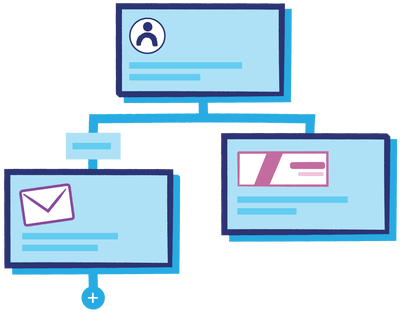5 Key Marketing Automation Tools for Small Businesses in 2023
Great marketing automation can be a game-changer for business owners, so learn all about the best marketing automation tools for your small business.
Read More
In today’s rapidly evolving digital landscape, it’s more important than ever for businesses to optimize their marketing efforts everywhere they can. And it’s why the role of marketing automation has become increasingly prominent — a once nice-to-have technology has become a necessary tool for businesses looking to grow or even maintain current levels of success.
Let’s explore the concept of marketing automation, its various types, and the wide array of benefits it offers to businesses.

Marketing automation refers to the use of software and technologies to carry out repetitive marketing tasks or activities. It involves employing a combination of tools, strategies, and workflows to streamline marketing efforts, nurture prospects, and improve overall campaign efficiency. Effective marketing automation not only saves human marketers time throughout the day, it powers complex processes like audience targeting and personalization that lead to revenue generation.
When you think about “marketing automation,” email likely comes to mind first. Email marketing automation enables businesses to send targeted, personalized emails based on customer behavior, preferences, and lifecycle stage. Email automation tools help create dynamic email campaigns triggered by specific events or actions, such as welcoming new subscribers, promoting products sitting in a user’s cart, or sending follow-up emails after a purchase.
Social media automation tools allow businesses to schedule, publish, and analyze social media content across various social platforms. By automating social media posting and monitoring, companies can maintain a consistent online presence, better engage with their audience, and measure the effectiveness of their social media efforts.
Customer Relationship Management (CRM) automation streamlines various customer-centric processes, including lead management, sales tracking, and customer support. With CRM automation, businesses can track customer interactions, analyze data, and personalize their sales approach, leading to improved customer satisfaction and higher conversion rates.
Omnichannel automation involves delivering a seamlessly connected customer experience across multiple channels, such as email, social media, websites, and mobile apps. When businesses integrate and automate marketing efforts across channels, they’re able to reach and engage customers in the right place, at the right time, with the right message. This combination encourages conversions while giving the business a better understanding of customer needs and behaviors throughout the buying journey.
Automation tools collect and analyze customer data with each interaction, providing valuable insights into audience behavior, preferences, and purchasing patterns. This allows for precise targeting across channels and hyper-personalization, and therefore, better campaign results.
Once you decide you’re ready to add automation to your marketing operations, your first step should be to define your marketing objectives and identify areas where automation can provide the most impact.
Then, and most importantly, research and select the right software. Rather than betting on piecemeal solutions, look for an established partner that offers services across your preferred marketing channels. Prioritize features like AI-powered targeting and bidding, ecommerce store integrations, dynamic product recommendations, and flexible, cross-channel reporting.


Introducing the only tool that lets you create consistent, personalized, and automated campaigns across display ads, social ads, and email — all from one place.
Learn MoreMarketing automation refers to the use of software and technologies to carry out repetitive marketing tasks or activities. It involves employing a combination of tools, strategies, and workflows to streamline marketing efforts, nurture leads, and improve overall campaign efficiency.
The benefits of marketing automation include increased efficiency, improved lead nurturing, more customer engagement, scalability, and ROI and revenue growth.
Marketing automation software collects customer data via customer interactions (website visits, email clicks, social media engagement, etc.) Then, it uses that information to trigger and carry out designated marketing tasks. For example, when a shopper adds an item to their cart and leaves without checking out, the software may automatically send that person an email encouraging them to complete their purchase or offering a discount.
Marketing automation is important because it increases efficiencies and improves the customer experience, all while providing businesses with a deeper understanding of their target audience.
Great marketing automation can be a game-changer for business owners, so learn all about the best marketing automation tools for your small business.
Read More
This Spring, we introduced our automation builder! A seamless way to connect your display ads, social ads, and email in one place. Launch, manage, measure, improve. Learn more here.
Read More
Learn more about the differences between CRM and marketing automation as well as how to use them together to maximize your overall marketing strategy.
Read More